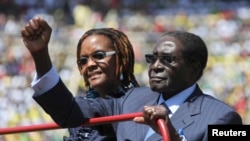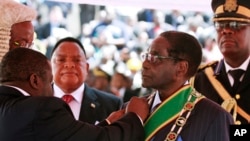JOHANNESBURG —
Zimbabwe's President Robert Mugabe has been sworn in after another election that critics and observers say was marred. Mugabe was unapologetic as he took another oath of office despite widespread claims of rigging.
Robert Mugabe once said he would rule Zimbabwe until he is 100.
On Thursday, as he took his seventh oath of office as Zimbabwe’s leader, that prospect seemed increasingly likely. Mugabe was re-elected July 31 with 61 percent of the vote - in balloting that the opposition and Western powers deemed to be rigged.
The opposition MDC party boycotted the ceremony where Mugabe pledged to serve another five years. That commits him to being in office until the age of 94. He says he will run again after that.
Months before his re-election Mugabe said “my people still need me.” He is the only post-independence leader Zimbabwe has known.
Analyst Tom Wheeler, a former South African diplomat, says Mugabe showed promise as an emerging leader in the early 1980s, when he rose to power as a freedom fighter who battled to end white rule and achieve independence for Zimbabwe.
But Wheeler says Mugabe’s chief weakness comes straight out of an ancient Greek drama: Pride.
"He seems to have fallen into the trap of a typical African leader of that era who could not foresee the possibility of giving up power. That the idea of free and fair elections, which would lead to his departure from the scene, is just not thinkable and he remains almost one of the last of that particular era of leader… so, in one sense, he’s a clever, well-educated man who did good things for Zimbabwe in the beginning. But there were also some really bad things,” said Wheeler.
Mugabe’s record has indeed been a mottled one.
When the bespectacled, suit-wearing leader travelled to England in 1979 to negotiate the nation’s independence from Britain, former white Zimbabwean leader Ian Smith described Mugabe as “reasonable.”
In his first post-election speech in 1980, he called on Zimbabweans of all sides to forget their racial divides and devote themselves to their shared future. He urged them to “turn our swords into plowshares” and to join hands.
That inclusive Mugabe didn’t last long. In 1982, soldiers under his command killed an estimated 20,000 people in an area that opposed him politically.
At the turn of this century, his government ordered the often-violent seizures of farms that belonged to white farmers. He and his inner circle have been under harsh Western sanctions for more than a decade for allegedly committing human rights abuses.
After winning this last election, he called on his rivals to “go hang.” Then, adding insult to insult, he said, “If they die, even dogs will not sniff at their corpses.”
Faith Zaba has served as political editor and news editor for the Zimbabwe Independent newspaper. Mugabe, she says, is like the sun around which all of Zimbabwe’s political players revolve.
She says that despite the fiery rhetoric, Mugabe has actually softened a bit in his advanced age - and may even be poised to reach out to his rivals in the Movement for Democratic Change.
“In terms of the way he’s approaching things, he’s not as hard-hitting as he was before 2009," said Zaba. "He seems to have become more accommodative. So I think in terms of his approach, I think there’s been some changes. Even the talks now, there’s talks that he’s planning to engage the MDC-T and even Professor Welshman Ncube’s party, so that he accommodates some ministers, people from those parties in his new Cabinet. That’s a different Mugabe that we’re seeing.”
But South Africa-based opposition activist Kumbirai Muchemwa says Mugabe is a fallen hero.
“I think as a person, people used to have great admiration and respect for him. But I think he has disappointed a lot of Zimbabweans in the sense that, you know, he has put politics above the welfare of ordinary Zimbabweans. … If he really cared, then he would have put a better plan in front of the Zimbabweans for the management of the economy after this election. If Robert Mugabe really cared about Zimbabweans in general, he wouldn’t insult Zimbabweans at every platform. When you say, ‘people can go and hang,’ I’ve often heard of other presidents at their inauguration or after winning an election, they try and bring people together, not to insult them. So, in my mind, he doesn’t care,” he said.
Muchemwa said he couldn’t bring himself to watch the inauguration. “I didn’t have the heart for it,” he said.
But Mugabe is unlikely to take such words to heart. Earlier this year, Mugabe told a South African filmmaker that he thought South African icon Nelson Mandela - who is almost universally loved for his policy of reconciliation - was “too good, too much of a saint.”
Few people would accuse Mugabe of the same.
Robert Mugabe once said he would rule Zimbabwe until he is 100.
On Thursday, as he took his seventh oath of office as Zimbabwe’s leader, that prospect seemed increasingly likely. Mugabe was re-elected July 31 with 61 percent of the vote - in balloting that the opposition and Western powers deemed to be rigged.
The opposition MDC party boycotted the ceremony where Mugabe pledged to serve another five years. That commits him to being in office until the age of 94. He says he will run again after that.
Months before his re-election Mugabe said “my people still need me.” He is the only post-independence leader Zimbabwe has known.
Analyst Tom Wheeler, a former South African diplomat, says Mugabe showed promise as an emerging leader in the early 1980s, when he rose to power as a freedom fighter who battled to end white rule and achieve independence for Zimbabwe.
But Wheeler says Mugabe’s chief weakness comes straight out of an ancient Greek drama: Pride.
"He seems to have fallen into the trap of a typical African leader of that era who could not foresee the possibility of giving up power. That the idea of free and fair elections, which would lead to his departure from the scene, is just not thinkable and he remains almost one of the last of that particular era of leader… so, in one sense, he’s a clever, well-educated man who did good things for Zimbabwe in the beginning. But there were also some really bad things,” said Wheeler.
Mugabe’s record has indeed been a mottled one.
When the bespectacled, suit-wearing leader travelled to England in 1979 to negotiate the nation’s independence from Britain, former white Zimbabwean leader Ian Smith described Mugabe as “reasonable.”
In his first post-election speech in 1980, he called on Zimbabweans of all sides to forget their racial divides and devote themselves to their shared future. He urged them to “turn our swords into plowshares” and to join hands.
That inclusive Mugabe didn’t last long. In 1982, soldiers under his command killed an estimated 20,000 people in an area that opposed him politically.
At the turn of this century, his government ordered the often-violent seizures of farms that belonged to white farmers. He and his inner circle have been under harsh Western sanctions for more than a decade for allegedly committing human rights abuses.
After winning this last election, he called on his rivals to “go hang.” Then, adding insult to insult, he said, “If they die, even dogs will not sniff at their corpses.”
Faith Zaba has served as political editor and news editor for the Zimbabwe Independent newspaper. Mugabe, she says, is like the sun around which all of Zimbabwe’s political players revolve.
She says that despite the fiery rhetoric, Mugabe has actually softened a bit in his advanced age - and may even be poised to reach out to his rivals in the Movement for Democratic Change.
“In terms of the way he’s approaching things, he’s not as hard-hitting as he was before 2009," said Zaba. "He seems to have become more accommodative. So I think in terms of his approach, I think there’s been some changes. Even the talks now, there’s talks that he’s planning to engage the MDC-T and even Professor Welshman Ncube’s party, so that he accommodates some ministers, people from those parties in his new Cabinet. That’s a different Mugabe that we’re seeing.”
But South Africa-based opposition activist Kumbirai Muchemwa says Mugabe is a fallen hero.
“I think as a person, people used to have great admiration and respect for him. But I think he has disappointed a lot of Zimbabweans in the sense that, you know, he has put politics above the welfare of ordinary Zimbabweans. … If he really cared, then he would have put a better plan in front of the Zimbabweans for the management of the economy after this election. If Robert Mugabe really cared about Zimbabweans in general, he wouldn’t insult Zimbabweans at every platform. When you say, ‘people can go and hang,’ I’ve often heard of other presidents at their inauguration or after winning an election, they try and bring people together, not to insult them. So, in my mind, he doesn’t care,” he said.
Muchemwa said he couldn’t bring himself to watch the inauguration. “I didn’t have the heart for it,” he said.
But Mugabe is unlikely to take such words to heart. Earlier this year, Mugabe told a South African filmmaker that he thought South African icon Nelson Mandela - who is almost universally loved for his policy of reconciliation - was “too good, too much of a saint.”
Few people would accuse Mugabe of the same.





